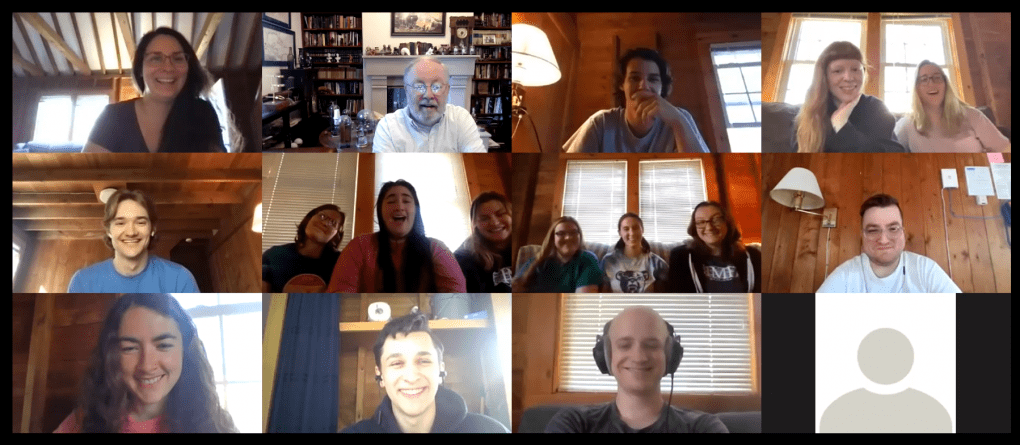
From left to right: Top row: Dr. Shawn Arellano (WWU), Dr. Craig Young (UO), Michael Gray (NCSU), Tessa Beaver (WWU), Laura Murray (WWU) Middle row: Liam Patrick (CSUMB), Fiona McBride (WWU), Carmen Sanchez-Reddick (UO), Casey Barnard (UO), Caitlin Plowman (UO), Lauren Rice (UO), Avery Calhoun (UO), Mitchell Hebner (WWU). Bottom row: Sinja Rist (UO), Dexter Davis (WWU), Ian Grace (NCSU), Leo Zaklikowski (UO).
Continuing our Seep Animal Larval Transport (SALT) research, the Larval Lab is currently quarantining in Woods Hole, Massachusetts along with students from the labs of Dr. Craig Young (University of Oregon) and Drs. Eggleston and He (North Carolina State University), and even one scientist from Germany!
While we are restricted to our cottages at Devil’s Lane, Marine Biological Laboratory’s housing, that doesn’t mean we aren’t staying busy! Pictured above is one of multiple lectures hosted by Dr. Craig Young, this one focusing on the history of deep-sea larval biology, paired with Dr. Young highlighting his fascinating collection of historical microscopes. We will have additional lectures about larval morphology, preparing us for larval identification while at sea!
While we learn about the science we will be conducting, our “quaranteam”, our team of quarantining scientists, is also meeting each other. In our free time we are sharing scientific papers, discussing research questions and potential projects, continuing classes, and becoming familiar with native fauna like ticks, turkeys, and snapping turtles in our backyards.
In order to ensure safe science at sea, we are following thorough safety protocols amidst the COVID-19 pandemic. After two weeks of isolation, daily temperatures checks, and two COVID tests, we will be able to mobilize on board the R/V Thompson (Cruise TN-391) on Sunday, May 23rd. On board the ship we will continue to practice safety guidelines, to protect each other and ourselves.
Thank you to the Marine Biological Laboratory (MBL) team for providing housing, food, and working with us through these two weeks, and thank you to the University of Washington for communicating with us about COVID protocols for the R/V Thompson. We are all so excited to be at sea and are thankful to have the opportunity to continue deep-sea research given the pandemic.
To read more about our project visit our project’s website click here and stay tuned for more updates about what we are doing at sea!
